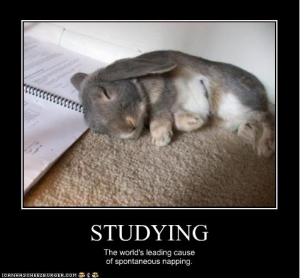 Many of my academic coaching clients have a devil of a time studying for tests. The reasons are varied, but one major stumbling block I’ve uncovered is this: students do not understand the purpose that homework plays in preparing them for tests! Our current education system rewards students for mindlessly following teacher’s instructions, rather than thinking about the purpose behind the instructions. I’ve repeatedly discovered that it’s my role as an academic coach to help students uncover the connections between homework and what’s on the test.
Many of my academic coaching clients have a devil of a time studying for tests. The reasons are varied, but one major stumbling block I’ve uncovered is this: students do not understand the purpose that homework plays in preparing them for tests! Our current education system rewards students for mindlessly following teacher’s instructions, rather than thinking about the purpose behind the instructions. I’ve repeatedly discovered that it’s my role as an academic coach to help students uncover the connections between homework and what’s on the test.
Let’s look at two clients in particular, who are learning to understand the distinction between studying versus doing homework, and how both tasks are a crucial part of test preparation.
Michaela and Grant are both 9th graders who are consistently scoring Cs and Ds on their history tests. The other day I asked Michaela to show me her homework assignments, and sure enough: it appeared to me that she had copied the definitions from the textbook into her homework assignment.
Technically speaking, Michaela is answering her homework questions correctly; however, when she copies the definitions, she’s not actually internalizing the information she’s supposedly “learning.” When I asked her if she even pays attention to the meaning of what she’s writing, she confirmed, “No, I don’t. I just scan for the answers and write them down. That’s what I’m supposed to do, isn’t it?”
It hadn’t occurred to Michaela that the purpose of homework is to be introduced to new information, and then to practice that information with the purpose of learning it. If she mindlessly reads and answers questions, she *might* get a 100% on her homework assignment — but she’s making studying for the test extra hard.
We then discussed the difference between doing homework (when the teacher structures the learning activity, and you make sure you’ve learned it) and studying (when you structure your own learning activity to make sure that you’re understanding the information).
Michaela was shocked, and a little disheartened, to learn that test prep begins waaaaaaay back when she first does a homework assignment. It’s important for her to:
a) think actively when completing the teacher-assigned activity, so that she is aware of of what she is learning as she learns it (this is homework), and then
b) take some time to determine her strengths and weaknesses, and then (using multiple modalities) drill the weak areas and reinforce the strengths (this is studying).
If she does her homework with conscious attention to what she’s learning, and then several times a chooses to study what she’s learned, she will be much better prepared for the eventual test.
Another client named Grant was working on a history worksheet during our coaching session. At one point, the worksheet asked Grant to make a list of the five beliefs shared by the enlightenment philosophers. Just as Michaela had done, Grant copied the beliefs directly from the textbook. When I asked him, “Do you even understand what you are writing? Would you be able to remember what these mean for the test?” he answered honestly, “Probably not.”
Together we practiced going back, rereading the textbook, looking up confusing words, summarizing the information, and only THEN writing it down into his homework. Although this kind of mindful attention is more time-consuming, it saves time in the long run because Grant will not need to re-learn the information the night before the test.
I know it will probably take Michaela and Grant a couple of years before they fully “get” the distinction between studying and doing homework and how both impact their time efficiency and performance on tests. Both students have learning disabilities which make them slower processors, which makes the entire learning process — as well as thinking about their own thinking — a bit harder for them. Many students don’t fully integrate these processes until college!
In the meantime, Michaela and Grant will practice, practice practice. I’ve been an academic coach for long enough, I know that by the end of their sophomore year, they will (most likely) turn the corner and be more interested in improving their learning processes. One step at a time…
If you’d like a free fifteen minute consultation about your student and whether he or she could benefit from academic coaching, please contact me. I’d be happy to talk in more detail.
Photo by icanhascheezburger.com.
